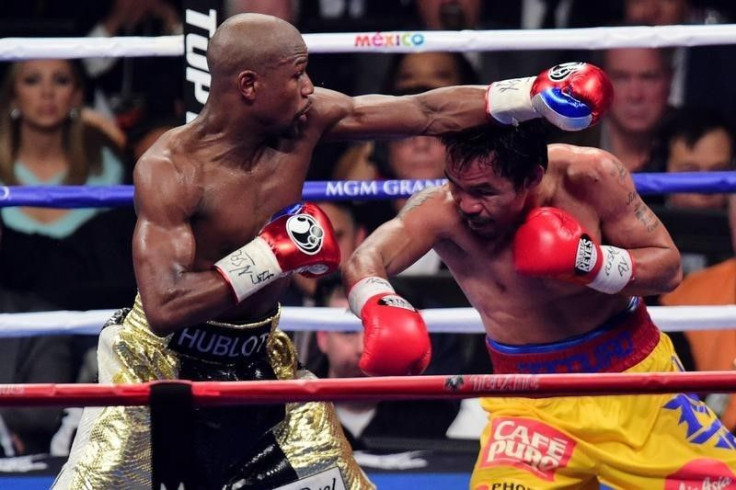Will HBO KO Those Who Illegally Streamed Pacquiao vs. Mayweather?

Anybody looking for a way to watch Saturday's Mayweather-Pacquiao fight that didn’t involve spending big bucks had to go no further than Twitter, which was filled with dozens of illegal streams of the $300 million fight hosted on Periscope. The use was so widespread that Twitter CEO Dick Costolo was crowing about it.
And the winner is... @periscopeco
- dick costolo (@dickc) May 3, 2015Though he was referring to the access that Periscope offered users before and after the fight, Costolo’s tweet was probably a bad idea: Twitter is already in HBO’s doghouse because it has become a clearinghouse for links to illegal streams of the broadcaster’s content.
But suing people is timely, expensive and difficult. Is it worth it for HBO? Neither HBO nor Top Rank, which held the broadcast and pay-per-view rights to the fight, respectively, returned requests for comment. But a number of lawyers contacted by International Business Times expressed skepticism. “I doubt HBO is going to do this,”said Eric Rayman, an attorney at Miller Korzenik Sommers Rayman, who has practiced in intellectual property in New York for 30 years. “The cost and the bad publicity is something it has to weigh.”
Fixing For A Fight
As digital technology has made it easier for users to livestream digital content, the war between rights holders and people illegally accessing that content has intensified. Last year, Zuffa, the company that owns the mixed martial arts promotion company UFC (Ultimate Fighting Championship), got an illegal streaming service taken down, then went a step further when it announced it was going to sue all of the site’s individual users as well.
While it’s unlikely HBO would go after the people watching the streams, legal action against the Periscope users hosting them would be consistent with some other moves it has made. Last week, the broadcaster sued a pair of sites that claimed they would offer streams of the site days before the fight was scheduled to take place.
Moving Target
Because of the Digital Millennium Copyright Act’s “safe harbor” provision, suing Twitter itself is pretty much out of the question. The safe harbor provision holds that services like Twitter can’t be held responsible for inspecting every piece of content that comes through its pipes. If a rights holder like HBO serves Twitter with a takedown notice, Twitter must comply with that request promptly; Twitter received more than 60 takedown requests, a report in Advertising Age said. But for an event like a boxing match, which airs only once and could be over in a matter of minutes, takedown notices offer poor cover against infringement.
Identifying the users who streamed the fight and going after them individually has its own challenges. Not everybody provides comprehensive identifying information on their Twitter accounts, and while Top Rank or HBO could hack through the layers of protection that digital media typically provides -- “They can make motions to compel them to give up a user’s identity,” said Craig Delsack, a media and intellectual property attorney based in New York City -- doing so takes time, especially if the Periscope account users are careful. To get a user’s email address from Twitter, it must serve Twitter with a subpoena. If that subpoena yields an equally cryptic Gmail address, the next step is a subpoena of Google, and so on.
Uncertain Return
If the rightsholders took all those necessary steps, they could pursue two different kinds of damages: actual, or statutory. Actual damages are exactly what they sound like -- a dollar-for-dollar reimbursement of the money lost because of the infringement. A Periscope user who hosted a stream that 1,000 people saw, for example, could be on the hook for nearly $100,000, or 1,000 times the $99 pay-per-view fee.
Statutory damages are a bit more complicated, and they are determined by a jury, which must consider a whole host of factors, including whether or not the infringement was willful and the extent to which the damages awarded will deter future people from trying the same thing.
In cases where someone seeks statutory damages, the penalty can be very steep: up to $150,000 per copyright violation. But Matt Oppenheim, a partner at Oppenheim + Zebrak, thinks that, even in the case of users who streamed the entire fight with the intent of deliberately circumventing HBO’s exclusive rights, any penalty would be low. “It's unlikely that a jury would believe that Floyd Mayweather and Manny Pacquiao really are sympathetic figures in need of more revenue,” Oppenheim said.
© Copyright IBTimes 2024. All rights reserved.




















